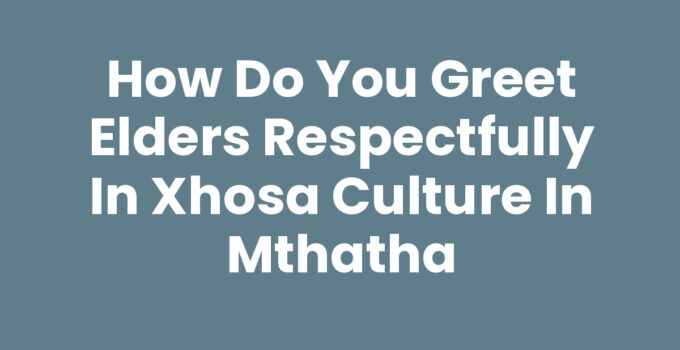Greeting elders in Xhosa culture is more than just a formality; it is a vital tradition steeped in respect, history, and connection. This practice transcends mere words and embodies the cultural values of the Xhosa people. In Mthatha, a pivotal region in Xhosa heritage, delivering a respectful greeting holds a profound significance that fosters community bonds and honors the wisdom of the elders.
How Do You Greet Elders Respectfully In Xhosa Culture In Mthatha
To greet elders respectfully in Xhosa culture, especially in Mthatha, you should follow specific customs and expressions unique to the culture. Here is a step-by-step guide to ensure you greet them appropriately:
- Approach with Respect: As you approach an elder, ensure your demeanor conveys respect. Maintain good posture, and if possible, bow your head slightly as a sign of respect.
- Use Appropriate Titles: Always address elders with their respective titles. Words like ‘Mkhulu’ (grandfather), ‘Noko’ (grandmother), ‘Baba’ (father), or ‘Mama’ (mother) are used to show respect.
- Greet in Xhosa: Use traditional greetings. The most common is ‘Uxolo’ (Excuse me/Peace) when approaching. If you know the family’s clan, it adds to the respect and connection.
- Hand Gestures: In some contexts, it is customary to extend your hand to shake, but be prepared to let the elder initiate the handshake or respond with a gentle, open-handed gesture as a sign of friendship.
- Stand or Sit Appropriately: If the elder is seated, it is respectful to remain standing unless invited to sit. If you greet them while seated, ensure you are positioned in a way that doesn’t seem dismissive.
- Ask about Their Wellbeing: Following the greeting, ask how they are doing, which displays your interest in their health and well-being. Phrases like ‘Uphi na uMntwana/Umntwana onjani?’ (How is the child?) can be used, adjusting based on the situation.
Each step signifies an acknowledgment of the elder’s role and the community’s structure, reinforcing respect and cultural identity.
See Also: What Are The Options For Special Needs Education In Mthatha
Cultural Significance of Respectful Greetings
In Xhosa culture, greetings serve to strengthen social ties within the community. Elders command respect due to their life experiences and knowledge, and a proper greeting is a reflection of your understanding of this cultural norm. Elders often play mentorship roles in their families and communities, thus acknowledging them in a respectful manner reinforces community cohesion.
You Might Also Like: What Are The Best Primary Schools In Mthatha: A Comprehensive Guide
Common Mistakes to Avoid When Greeting Elders
While understanding how to greet elders is essential, being aware of common pitfalls can help avoid potential disrespect:
- Using First Names: Avoid calling elders by their first names unless explicitly invited to do so.
- Inappropriate Body Language: Your body language should convey respect. Avoid crossing your arms or appearing disinterested.
- Ignoring Traditional Practices: Each clan may have specific practices—research and adhere to these to avoid seeming disrespectful.
By steering clear of these mistakes, you can navigate social interactions with dignity and respect.
Recommended Reading: What Are The Rules About Keeping Dogs And Other Pets In Mthatha Suburbs
Conclusion
Greeting elders respectfully in Xhosa culture is not merely a formality—it is a deep-seated tradition that fosters respect and community connection. By following the steps outlined in this guide, you integrate yourself more fully into Xhosa customs and demonstrate an understanding of their values. In Mthatha, where culture is rich and vibrant, these acts of respect allow for the preservation and continuation of traditions through generations.
Recommended Guide: How Do I Find A Tutor For My Wsu Courses, Mthatha
Frequently Asked Questions
What phrases are essential in Xhosa greetings?
Essential phrases include 'Uxolo' (Excuse me/Peace) and appropriate titles like 'Mkhulu' or 'Noko' for respect.
Is body language important when greeting elders?
Yes, body language is crucial. Always carry yourself respectfully and maintain appropriate posture.
How do clan affiliations affect greetings?
Clan affiliations can alter the way you greet specific elders, emphasizing the importance of local customs and traditions.









